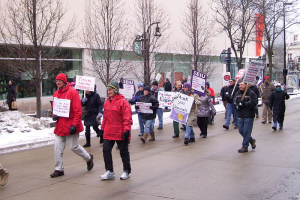The Constitutional Challenge to Act 10 is Serious
 On Friday, Judge Juan Colas issued a ruling that struck down Act 10, the “Budget Repair Bill,” on the grounds that the law violates the Wisconsin and U.S. Constitutions. In essence, he held that the law differentiates between entities that represent public employees in collective bargaining — imposing conditions on certain bargaining entities but not others – and that the State had failed to advance a sufficient justification for this disparate treatment. According to Judge Colas, the differential treatment of bargaining entities violated the First Amendment right of the affected unions to association and expression, and it also violated the Equal Protection Clause. Judge Colas also held that the law violates the Home Rule provisions of the Wisconsin Constitution by dictating rules for Milwaukee that the law did not apply to other municipalities.
On Friday, Judge Juan Colas issued a ruling that struck down Act 10, the “Budget Repair Bill,” on the grounds that the law violates the Wisconsin and U.S. Constitutions. In essence, he held that the law differentiates between entities that represent public employees in collective bargaining — imposing conditions on certain bargaining entities but not others – and that the State had failed to advance a sufficient justification for this disparate treatment. According to Judge Colas, the differential treatment of bargaining entities violated the First Amendment right of the affected unions to association and expression, and it also violated the Equal Protection Clause. Judge Colas also held that the law violates the Home Rule provisions of the Wisconsin Constitution by dictating rules for Milwaukee that the law did not apply to other municipalities.
The reaction to the ruling from the Walker Administration – that Judge Colas is a “liberal Dane County judge” — was as hollow as it was predictable. Some supporters of the Governor view the judiciary as an obstacle to their political agenda. Therefore, judges who do not agree with the Administration’s legal arguments become, in their mind, opponents who must be demonized (like Dane County Circuit Judge Maryann Sumi) or else targeted with frivolous disciplinary complaints.
Clearly, some supporters of the Walker Administration have a difficult time separating the political debate over Act 10 from the separate legal debate over its contents.


![IMG_7297[1]](http://law.marquette.edu/facultyblog/wp-content/uploads/2012/08/IMG_729716-300x200.jpg)